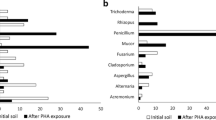Abstract
This paper examined the biodegradability of a new aliphatic polyester, polyethylene succinate (PES), at a high incubation temperature of 50°C. The distribution and population of total colonies and of PES degrading micro organisms on polymer-emulsified agar plates were determined using the plate count and clear zone methods. The PES-decomposers were present in six of 10 soil samples and the total number ranged from 2.0×104 to 2.2×106 c.f.u./g of samples. Degrading microorganisms constituted between 20 and 80% of the total colonies on PES–agar plates. A single PES-degrading strain, TT96, was isolated and tested for its biodegrading capacity on PES powder and on other aliphatic polyesters: poly(beta-hydroxybutyrate) (PHB), polycaprolactone (PCL), poly(butylene succinate) (PBS), and poly(L-lactide) (PLA). Degraded films of PES and PBS were presented and compared using scanning electron microscopy. Strain TT96 was able to create clear zones on all the polymers used, except on PHB-agar plates. Liquid culture test after 2 weeks showed that TT96 completely degraded PCL powder but had very little activity on other samples. Scanning electron micrograph confirmed the microbial attack of TT96 on PES and PBS films. PES film surfaces were degraded more uniformly compared to PBS films which were decomposed only in some parts.
Similar content being viewed by others
References
Fields, R.D., Rodriguez, F., & Finn, R.K. 1974 Microbial degradation of polyesters:Polycaprolactone degraded by P. pullulans. Journal of Applied Polymer Science 18, 3571–3576.
Fujimaki, T., Watanabe, N., Moteki, Y. & Imaizumi, M. 1995 Processibility of a new biodegradable aliphatic polyester ``Bionolle''. Fourth International Workshop on Biodegradable Plastics and Polymers. October 11-14 1990, New Hampshire, USA.
Maeda, Y., Nakayama, A., Iyoda, J., Hayashi, K. & Yamamoto, N. 1993 Synthesis and biodegradation of the copolymers of succinic anhydride with various oxiranes. Kobunshi Ronbunshu 50, 723–729.
Nishida, H. & Tokiwa, Y. 1993 Distribution of poly(beta-hydroxybutyrate) and polycaprolactone aerobic degrading microorganisms in different environments. Journal of Environment Polymer Degradation 1, 227–233.
Pranamuda, H., Tokiwa, Y. & Tanaka, H. 1995 Microbial degradation of an aliphatic polyester with high melting point, poly(tetramethylene succinate). Applied Environmental Microbiology 61, 1828–1832.
Tokiwa, Y., Ando, T. & Suzuki, T. 1976 Degradation of polycaprolactone by a fungus. Journal of Fermentation Technology 52, 393–398.
Tokiwa, Y. & Suzuki, T. 1974 Degradation of poly-ethylene glycol adipate by a fungus. Journal of Fermentation Technology 54, 603–607.
Tokiwa, Y., Iwamoto, A., Koyama, M., Kataoka, N. & Nishida, H. 1992 Biological recycling of plastics containing ester bonds. Makromolekulare Chemie–Makromolecular Symposia 57, 273–279.
Author information
Authors and Affiliations
Rights and permissions
About this article
Cite this article
Tansengco, M., Tokiwa, Y. Thermophilic microbial degradation of polyethylene succinate. World Journal of Microbiology and Biotechnology 14, 133–138 (1997). https://doi.org/10.1023/A:1008897121993
Issue Date:
DOI: https://doi.org/10.1023/A:1008897121993




